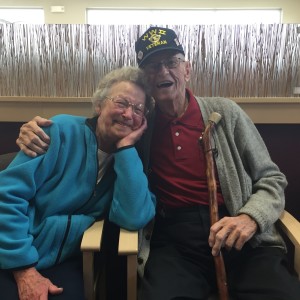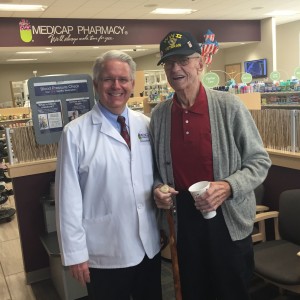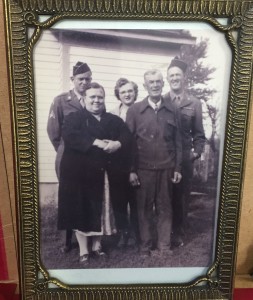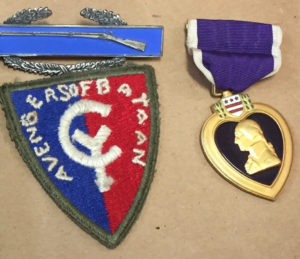Becoming a Man
Use controls above or click here to open this Hometown Heroes podcast in a new window
90-year-old Leo Neubauer of Centerville, IA appears on episode #456 of Hometown Heroes, airing January 27-29, 2017. A native of Osmond, NE, Neubauer served in the 38th Infantry Division in the Pacific during World War II.

Pat and Leo Neubauer after nearly 66 years of marriage. For more photos visit the Hometown Heroes Facebook page.
You’ll hear him remember growing up with four sisters and a brother during the Great Depression. “You ate what was on the table or you didn’t eat,” Leo explains. German was his first language, but if you listen to Leo’s interview, you’ll learn what he did as a youngster to trigger a change to English as the primary language of the Neubauer home. As a freshman in high school, he started working at a local butcher shop, and had ideas that carving meat might become a career for him. On December 7, 1941, he was “down at the crick” with three of his friends when they got word of the Japanese attack on Pearl Harbor. One of those friends, Don Schomer, was determined to enlist in the military. Don joined the Navy, and was on the USS Perry when it was sunk by a Japanese mine on September 13, 1944. Schomer was picked up by a rescue ship, but soon succumbed to his injuries, and was buried at sea. Leo’s older brother, Delmar, also joined the fight right away, eventually battling Nazi forces. “Stay out, brother, as long as you can,” you’ll hear Leo recall Delmar writing to him from Europe, where Delmar was wounded twice while serving with the 3rd Armored Division. “His jaw is all artificial,” Leo explains. “His teeth are all embedded in lead.” The death of one of his best friends, and the serious wounds suffered by his brother, give Leo powerful perspective on how fortunate he was in his own World War II experience.
He had heeded his brother’s advice, but eventually the draft came calling for Leo, and he’ll never forget the day he said goodbye to his parents in Osmond.
“That was the only time my dad cried,” you’ll hear Neubauer remember, with emotion welling up in his voice. “He said to my mother that they’re taking the last one.”
The teenager reported to Fort Leavenworth in Kansas for his basic training, and before long was headed out to the Pacific Theater from San Francisco. “You’re going underneath the Golden Gate Bridge,” he remembers being told aboard ship. “Take a good look. You might not see her again.” The journey across the ocean was memorable for a teenager who had never left Nebraska before being drafted into the Army, but he says he didn’t “become a man” until he came ashore in the Philippines with the 38th Infantry Division.
“When the first bullet went over my head, I become a man,” you’ll hear him explain.
Serving as a scout in a rifle platoon, Leo relied heavily on his Browning Automatic Rifle, especially during nighttime Banzai attacks that would light up the sky “like the Fourth of July.” He helped secure the Ipo Dam, restoring Manila’s water supply, later moving on through the Zig Zag Pass and clearing the enemy out of the Bataan Peninsula. Three years earlier, undersupplied and depleted American troops had been forced to surrender to the Japanese on Bataan and Corregidor, leading to the infamous Bataan Death March. Retaking that territory gave Leo and his fellow “Cyclone Division” soldiers a new moniker, “Avengers of Bataan.” To help illustrate what needed avenging, this episode contains a brief excerpt from an interview with Bataan Death March survivor Atilano David. For the complete interview with Mr. David, check out Hometown Heroes episode #336.
Leo Neubauer has his own survival story, thanks to a bomb that struck very close to his foxhole. “I jumped up to look, like a dang fool,” you’ll hear him say. “I didn’t stay down like I should have.” Shrapnel from the bomb struck him in the face, arm, leg, and groin. He knew he couldn’t leave his foxhole while the battle continued, so he had to find a way to tend to his own wounds in order to survive overnight.
“I took my pants off, tore my shorts up to make bandages,” Leo explains.

Leo with John Forbes, co-founder of Central Iowa Honor Flight.
When morning came, he made it to an aid station, and was then taken to a field hospital in order to have fragments removed from his face. Combat in the Pacific is not something Leo has discussed much over the seven decades that followed, and you’ll hear him mention that he’s sharing more in this interview than he ever has before. You’ll also hear what he experienced on the inaugural Central Iowa Honor Flight in 2009, highlighted by a visit to the National World War II Memorial. While standing in front of the “Freedom Wall” of gold stars, representing all Americans who died while serving during World War II, Leo reflected on his late friend Don Schomer, as well as fellow members of the Cyclone Division who never came home. “Finally, when you walk away, you forget,” he says. “You have to forget.” Coping for Leo means pushing those painful memories back inside, but he’s thankful for the experience of visiting the memorial. As we learn from John Forbes, honor flights can be as fulfilling for the volunteers who put them together as they are for the veterans who take those sentimental journeys. You’ll hear Forbes, an Iowa state representative, explain how the honor flight effort got off the ground there, and what it has meant to him. “It’s been an honor and a privilege to serve the Greatest Generation,” Forbes says. “It’s allowed me to really reflect on the freedoms I have.” He says fellow legislators from all parts of the political spectrum have participated, all coming away raving about the experience. The tears he has seen streaming down veterans’ cheeks at the World War II Memorial, the smiles on their faces, and the number of vets who have decided to open up about their experiences as a result have all brought great satisfaction. But the biggest impact of Forbes’ involvement with the Honor Flight Network has been a reinforcement of the gratitude he feels for World War II veterans.
“400,000 of them gave their lives up for this country,” Forbes says. “We should be so grateful.”



Pingback: Hometown Heroes Radio » Remembering a Spirited Survivor